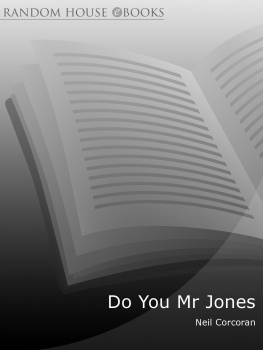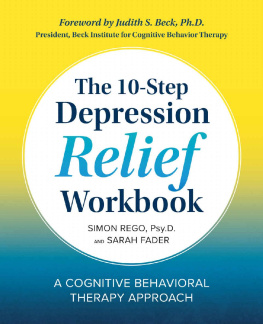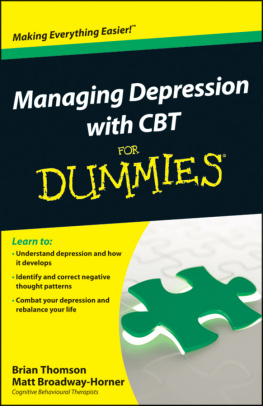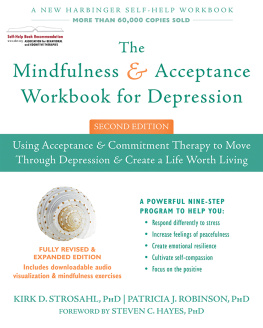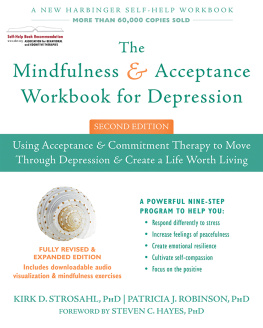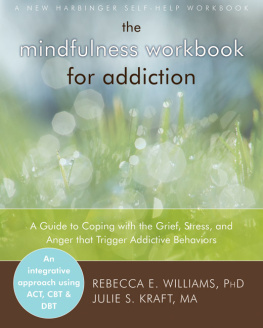Corcoran - Depression Solutions Workbook
Here you can read online Corcoran - Depression Solutions Workbook full text of the book (entire story) in english for free. Download pdf and epub, get meaning, cover and reviews about this ebook. year: 2014, publisher: New Harbinger Publications, genre: Science fiction. Description of the work, (preface) as well as reviews are available. Best literature library LitArk.com created for fans of good reading and offers a wide selection of genres:
Romance novel
Science fiction
Adventure
Detective
Science
History
Home and family
Prose
Art
Politics
Computer
Non-fiction
Religion
Business
Children
Humor
Choose a favorite category and find really read worthwhile books. Enjoy immersion in the world of imagination, feel the emotions of the characters or learn something new for yourself, make an fascinating discovery.
- Book:Depression Solutions Workbook
- Author:
- Publisher:New Harbinger Publications
- Genre:
- Year:2014
- Rating:5 / 5
- Favourites:Add to favourites
- Your mark:
- 100
- 1
- 2
- 3
- 4
- 5
Depression Solutions Workbook: summary, description and annotation
We offer to read an annotation, description, summary or preface (depends on what the author of the book "Depression Solutions Workbook" wrote himself). If you haven't found the necessary information about the book — write in the comments, we will try to find it.
The Depression Solutions Workbook presents a unique strengths-based treatment that integrates solution-focused therapy, cognitive behavior therapy (CBT), and motivational interviewing to target the three most common and damaging symptoms of depression: negative internal messages, lack of motivation to change, and addictive or self-destructive behavior.
Corcoran: author's other books
Who wrote Depression Solutions Workbook? Find out the surname, the name of the author of the book and a list of all author's works by series.
Depression Solutions Workbook — read online for free the complete book (whole text) full work
Below is the text of the book, divided by pages. System saving the place of the last page read, allows you to conveniently read the book "Depression Solutions Workbook" online for free, without having to search again every time where you left off. Put a bookmark, and you can go to the page where you finished reading at any time.
Font size:
Interval:
Bookmark:
Jacqueline Corcoran, Ph.D., is a professor at the Virginia Commonwealth University School of Social Work in Alexandria, VA. She has authored and coauthored many books on evidence and strengths-based models, including Clinical Applications of Evidence-Based Family Interventions, Clinical Assessment and Diagnosis in Social Work Practice, and Building Strengths and Skills.
The Depression Solutions Workbook includes tested methods for overcoming depression and is a tremendous resource for clinicians and clients alike.
Thorana S. Nelson, Ph.D., professor of family therapy at Utah State University

Publishers Note
This publication is designed to provide accurate and authoritative information in regard to the subject matter covered. It is sold with the understanding that the publisher is not engaged in rendering psychological, financial, legal, or other professional services. If expert assistance or counseling is needed, the services of a competent professional should be sought.
Corcoran, Mental Health in Social Work: Casebook on Diagnosis & Strengths, p. 189, 2009. Reproduced by permission of Pearson Education, Inc.
Bertolino, COLLABORATIVE COMPETENCY BASED COUNSELING & THERAPY, pp. 76 and 77, 2002. Reproduced by permission of Pearson Education, Inc.
Distributed in Canada by Raincoast Books
Copyright 2009 by Jacqueline Corcoran
New Harbinger Publications, Inc.
5674 Shattuck Avenue
Oakland, CA 94609
www.newharbinger.com
All Rights Reserved
Acquired by Melissa Kirk; Cover design by Amy Shoup;
Edited by Nelda Street; Text design by Tracy Carlson
Epub ISBN: 978-1-60882-574-5
Library of Congress Cataloging-in-Publication Data on file with the publisher
To Mark
To the staff at New Harbinger, especially Melissa Kirk, Jess Beebe, and Nelda Street, for their support and professionalism as I developed this workbook. I also wanted to thank the following former students for their contributions to case material: Angela Corriveau, Rosalind Frazer, Rosita Kline, Amantha Peterson, Janice Reeves, Sarah Roenfeldt, and Mary VanWyngarden.
Depression is the most common mental illness, afflicting 17 percent of the U.S. population at some point in their lifetimes (Kessler et al. 2003). This figure represents tens of millions of people, so youre not alone. If youve picked up this book, you probably suspect that youre depressed. What are the symptoms?
According to the Diagnostic and Statistical Manual of Mental Disorders (DSM) of the American Psychiatric Association (2000), which is the standard resource for mental health diagnosis in the United States, three different disorders represent depressive symptoms: major depressive disorder, dysthymic disorder, and adjustment disorder with depressed mood. Major depressive disorder is a period of two weeks or longer during which a person experiences a depressed mood or loss of interest in nearly all life activities. Dysthymic disorder represents a general personality style featuring symptoms that are similar to, but less intense than, those of major depression. In a given year, 1.5 percent of the adult population will suffer from dysthymic disorder (Kessler et al. 2003). Adjustment disorder with depressed mood represents depressive symptoms that develop from a persons response to an identifiable stressor, such as a divorce, a job loss, or a move. To qualify for this diagnosis, the symptoms must begin within three months of the stressor; they usually dont persist any longer than six months; and the persons job, academic, or social functioning must be temporarily impaired in significant ways. Youll find checklists for symptoms of depression in chapter 1.
What are the consequences of being depressed? You may already experience some of them, and they include:
- Isolation
- Employment problems
- Marital problems
- Parenting problems
- Suicidal thoughts or acts
- Health problems
More specifically, depression can be detrimental to physical health, contributing to lack of movement, more illnesses and doctor visits, and even early death. If you already have a medical illness (and people with illnesses and disability are at increased risk for depression), untreated depression can block recovery as well as your motivation and ability to follow through with prescribed treatment.
Finally, although depression often gets better after one episode, its also common for it to follow a chronic, relapsing, or recurrent course. That is, after one episode of depression, many people go on to have more episodes, even though they may recover in between.
As you can see, depression is a serious problem, and its important to tackle it, rather than wait to see if it will fade on its own. The Depression Solutions Workbook: A Strengths and Skills-Based Approach will help you do just that.
Following is a very brief description of each of the three theoretical approaches underlying The Depression Solutions Workbook: solution-focused therapy, motivational interviewing, and cognitive behavioral therapy. Then Ill show how the workbook is organized.
Solution-Focused Therapy
Solution-focused therapy, developed by Steve de Shazer, Insoo Kim Berg, Michelle Weiner-Davis, and colleagues (1986), focuses on a persons strengths, abilities, and other resources, helping the person discover and build upon these resources.
Twenty years ago, when solution-focused therapy was first developed, this was a revolutionary concept: to work on what the person was doing well, not what was wrong with him. Solution-focused therapy is based on the idea that change can occur rapidly, and that even a small change can lead to a spiral effect. The person takes a step in the right direction, prompting others around him to respond differently, which in turn makes him feel more empowered, encouraging further steps toward change. For example, suppose an older woman with depression motivates herself to get dressed and go for a walk so that the fresh air and exercise might give her more energy. Because shes up and around, she might run into a neighbor who responds in a friendly fashion. Then, feeling slightly better from the walk and social interaction,the woman may feel motivated to make a phone call to a recreation center to find out about local senior activities.
Both behaving differently and thinking differently are part of the processes of change (de Shazer 1994). In solution-focused therapy, people are considered the experts on themselves and are encouraged to find the solutions that are right for them. Discovering their own strengths mobilizes them to apply these strengths to problem situations.
The solution-focused techniques presented in this workbook will help you identify:
- What is working well in your life
- What you do differently during depression-free times
- The strengths youve developed as a result of your mood problems
- How youve managed to cope with hardships
Although you may currently feel hopeless about the future, solution-focused techniques will help you visualize a nondepressed future, which you can then start working toward.
Motivational Interviewing
Motivational interviewing, created by William R. Miller and Stephen Rollnick (2002), is a short-term approach that focuses on building motivation for change. Its rooted in the idea that ambivalence toward changewanting to change but also being stuck in the problemis a natural process. Like solution-focused therapy, motivational interviewing helps you develop hope and vision about the possibility of change. Techniques will focus on helping you see why it might be a good idea to go ahead and make changes, even while still working on identifying some of the reasons why depression might actually be meeting some of your needs. Motivational interviewing techniques in this workbook will help you:
Font size:
Interval:
Bookmark:
Similar books «Depression Solutions Workbook»
Look at similar books to Depression Solutions Workbook. We have selected literature similar in name and meaning in the hope of providing readers with more options to find new, interesting, not yet read works.
Discussion, reviews of the book Depression Solutions Workbook and just readers' own opinions. Leave your comments, write what you think about the work, its meaning or the main characters. Specify what exactly you liked and what you didn't like, and why you think so.


